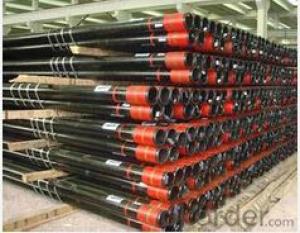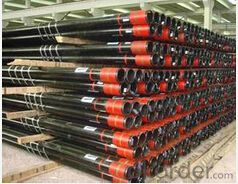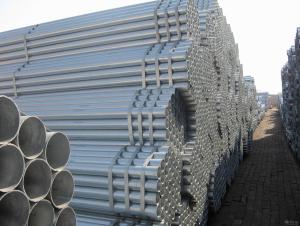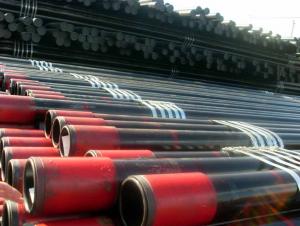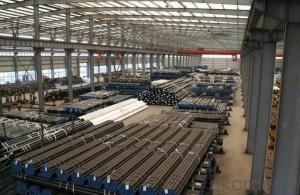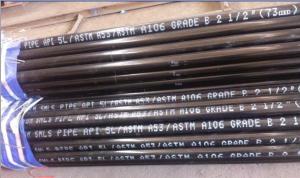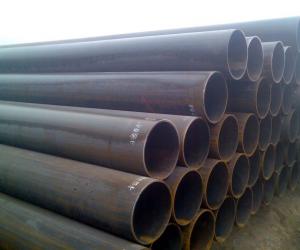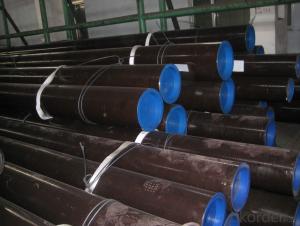seamless carbon steel pipe API 5CT oil casing tube
- Loading Port:
- Tianjin
- Payment Terms:
- TT OR LC
- Min Order Qty:
- 25 m.t.
- Supply Capability:
- 60000 m.t./month
OKorder Service Pledge
OKorder Financial Service
You Might Also Like
Specifications
Oil Casing Steel Pipe
1.Steel grade: J55 K55 N80-1 N80-Q L80 P110 ;
2.Size: Tubing 2 3/8" - 4 1/2" ;
3.length:R1,R2,R3 .
Technical data
Outsider Diameter | Wall Thickness | Grade | Thread | ||
Inch | mm | kg/m | 1b/ft | J55/K55/N80/L80/P110 | STC/LTC/BTC |
4 1/2” | 114.3 | 14.14-22.47 | 9.50-15.10 | J55/K55/N80/L80/P110 | STC/LTC/BTC |
5” | 127 | 17.11-35.86 | 11.50-24.10 | J55/K55/N80/L80/P110 | STC/LTC/BTC |
5 1/2” | 139.7 | 20.83-64.14 | 14.00-43.10 | J55/K55/N80/L80/P110 | STC/LTC/BTC |
6 5/8” | 168.28 | 29.76-47.62 | 20.00-32.00 | J55/K55/N80/L80/P110 | STC/LTC/BTC |
7” | 177.8 | 25.30-84.98 | 17.00-57.10 | J55/K55/N80/L80/P110 | STC/LTC/BTC |
7 5/8” | 193.68 | 35.72-82.30 | 24.00-55.30 | J55/K55/N80/L80/P110 | STC/LTC/BTC |
8 5/8” | 219.08 | 35.72-72.92 | 24.00-49.00 | J55/K55/N80/L80/P110 | STC/LTC/BTC |
9 5/8” | 244.48 | 48.07-112.51 | 32.30-75.60 | J55/K55/N80/L80/P110 | STC/LTC/BTC |
10 3/4” | 273.05 | 48.74-126.94 | 32.75-85.30 | J55/K55/N80/L80/P110 | STC/LTC/BTC |
11 3/4” | 298.45 | 6250-105.66 | 42.0-71.00 | J55/K55/N80/L80/P110 | STC/LTC/BTC |
13 3/8” | 339.73 | 71.43-107.15 | 48.00-72.00 | J55/K55/N80/L80/P110 | STC/LTC/BTC |
16” | 406.40 | 96.73-162.21 | 65.00-109.00 | J55/K55/N80/L80/P110 | STC/LTC/BTC |
18 5/8” | 473.08 | 130.22 | 87.50 | J55/K55/N80/L80/P110 | STC/LTC/BTC |
20” | 508.00 | 139.89-197.93 | 94.00-133.00 | J55/K55/N80/L80/P110 | STC/LTC/BTC |
API Oil Casing Pipe can be used for oil pipeline, oil natural gas, industrial gas, water transportation etc.
Packing Details:
Single with bubble bag and then in wooden case(fumigation certificate). Each case is clearly marked with:
1.Name & identification mark of manufacturer-HuaDong Brand
2. Batch number
3. Date of manufacturer
4. Material
5. Safe heating & application temperature
- Q: How are steel pipes used in the construction of desalination plants?
- Steel pipes are used in the construction of desalination plants for various purposes such as transporting seawater, brine, and treated water, as well as for structural support in the plant's infrastructure. These pipes are durable, corrosion-resistant, and capable of withstanding high-pressure conditions, making them ideal for the harsh and corrosive environment of desalination plants.
- Q: Can steel pipes be used for wastewater systems?
- Certainly, wastewater systems can indeed utilize steel pipes. Due to their impressive durability, strength, and resistance to corrosion, steel pipes have gained widespread popularity in wastewater systems. They possess the capacity to endure high pressure and effectively convey wastewater over extensive distances. Furthermore, steel pipes offer the advantage of ease in welding, allowing for the creation of a seamless pipeline system that minimizes the risk of leakage. Additionally, steel pipes demonstrate environmental friendliness as they can be recycled, rendering them a sustainable choice for wastewater systems. Nevertheless, it remains crucial to take into account the specific requirements of the wastewater system and seek guidance from experts to determine the most suitable material for the project.
- Q: What are the advantages of using steel pipes in irrigation systems?
- There are several advantages of using steel pipes in irrigation systems. Firstly, steel pipes are highly durable and can withstand harsh weather conditions and heavy loads, ensuring a long lifespan. Secondly, they have a high tensile strength, which means they can handle high pressure and water flow rates without the risk of bursting or leaking. Additionally, steel pipes are resistant to corrosion, which is crucial for maintaining water quality and preventing contamination. Lastly, steel pipes are easy to install and maintain, making them cost-effective in the long run.
- Q: What is the difference between internal coating and external lining of steel pipes?
- The main difference between internal coating and external lining of steel pipes lies in their purpose and location. Internal coating refers to the application of protective materials on the inner surface of the steel pipe, primarily to prevent corrosion, improve flow efficiency, and maintain the quality of transported fluids. On the other hand, external lining involves applying protective materials to the outer surface of the steel pipe, mainly for corrosion resistance, insulation, and protection against external elements. Therefore, while internal coating focuses on the interior protection and performance of the pipe, external lining shields the pipe from environmental factors and external damage.
- Q: What does "1.5" steel tube mean?
- This is neither an outer diameter nor an inner diameter; it should be related to an English unit at the beginning of the pipeline development; it is usually used to describe galvanized steel pipes; it corresponds to the English units as follows:4, in charge of: 4/8 inches: DN15;? 6 in charge: 6/8 inches: DN20;? 1 inch tube: 1 inches: DN25;? inch two tubes: 1 and 1/4 inches: DN32;? inch half tube: 1 and 1/2 inches: DN40;- inch tube: 2 inches: DN50;? three inch tube: 3 inches: DN80? four inch tube: 4 inches: DN100;
- Q: How are steel pipes used in the manufacturing of railways?
- Steel pipes are used in various ways in the manufacturing of railways. One of the primary uses of steel pipes in this context is for the construction of the railway track itself. Steel pipes are used to create the rail tracks that form the foundation of the railways. These pipes are typically welded together to form long, sturdy tracks that can withstand the weight and pressure of trains passing over them. Steel pipes are also used in the manufacturing of railway bridges and tunnels. These structures require strong and durable materials to ensure the safety and stability of the railway system. Steel pipes are often used in the construction of the support structures or piers that hold up the bridges. They are also used in the creation of tunnels, providing structural support and stability. Additionally, steel pipes are used in the manufacturing of various railway components and equipment. For example, steel pipes are used in the fabrication of railway signaling systems, which are responsible for controlling the movement of trains and ensuring safety. These pipes are often used to house and protect the electrical wiring and other components of the signaling systems. Furthermore, steel pipes are used in the manufacturing of railway carriages and locomotives. These pipes are used to create the framework and structure of the train, providing strength and stability. They are also used for various other purposes, such as the creation of air conditioning systems, brake systems, and fuel delivery systems within the train. Overall, steel pipes play a crucial role in the manufacturing of railways. They are used for the construction of rail tracks, bridges, tunnels, and various railway components and equipment. The strength and durability of steel make it an ideal material for ensuring the safety and efficiency of railway systems.
- Q: Can steel pipes be used for oil wells?
- Yes, steel pipes can be used for oil wells. Steel pipes are commonly used in the oil and gas industry due to their strength, durability, and resistance to corrosion. They are able to withstand the high pressures and temperatures that are encountered in oil well drilling and production. Steel pipes are also able to transport oil efficiently and safely from the well to the surface, making them a preferred choice for oil well infrastructure. Additionally, steel pipes can be easily welded and threaded, allowing for easy installation and maintenance in oil well applications.
- Q: What does cathodic protection of steel tubes mean?
- The corrosion of metals causes great economic losses directly or indirectly. Foreign statistics show that every year due to corrosion and scrap metal materials, equivalent to 20~40% of metal production, the world every year due to corrosion and loss of metal reached more than 1 tons.
- Q: What are the different joining methods for steel pipes?
- There are several joining methods for steel pipes, including welding, threaded connections, flanged connections, and mechanical couplings. Welding involves melting the ends of the pipes and fusing them together using heat. Threaded connections involve screwing the pipes together using threaded ends. Flanged connections use flanges that are bolted together to connect the pipes. Mechanical couplings use a variety of methods such as compression fittings or grooved couplings to connect the pipes without welding or threading.
- Q: How do steel pipes handle chemical substances?
- Steel pipes are highly resistant to chemical substances due to their durability and corrosion resistance. The smooth interior surface of steel pipes prevents the accumulation of chemical deposits, ensuring minimal reaction with the substances being transported. Additionally, steel pipes can be coated or lined with protective materials to further enhance the resistance against specific chemicals, making them a reliable choice for handling various chemical substances.
Send your message to us
seamless carbon steel pipe API 5CT oil casing tube
- Loading Port:
- Tianjin
- Payment Terms:
- TT OR LC
- Min Order Qty:
- 25 m.t.
- Supply Capability:
- 60000 m.t./month
OKorder Service Pledge
OKorder Financial Service
Similar products
Hot products
Hot Searches
Related keywords
